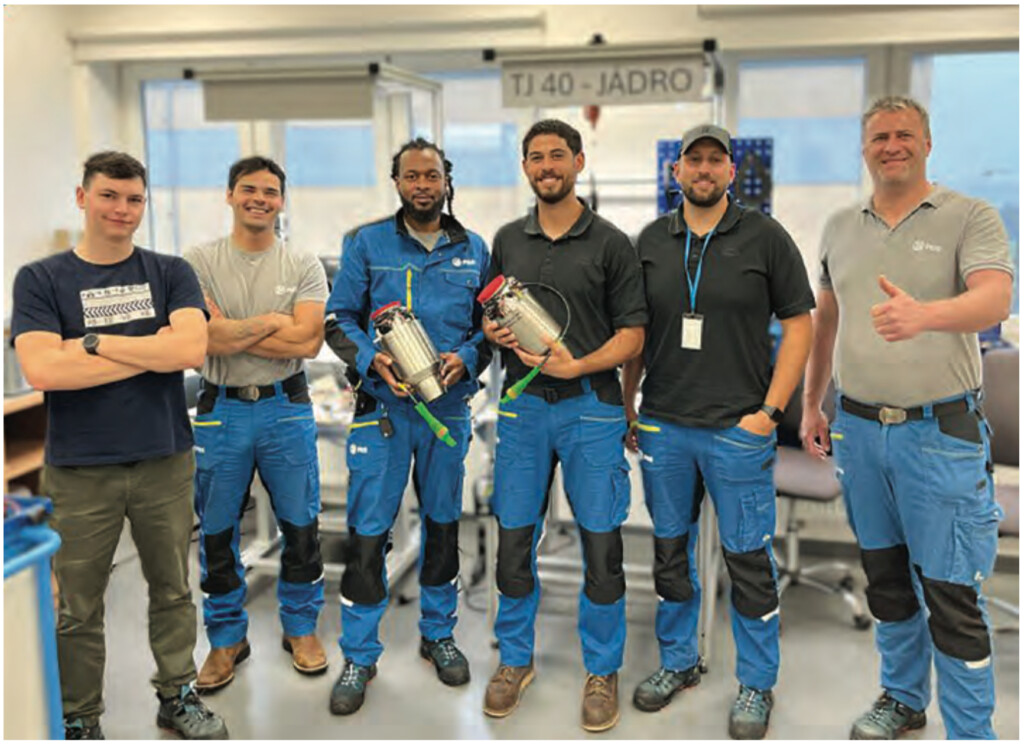High Stakes, Global Gains
Even as tariffs and market uncertainty challenge international trade, Georgia’s export sector keeps pushing forward.
Global trade made news in Georgia long before retaliatory tariffs started grabbing headlines. Once again, Georgia businesses found new opportunities in global markets, with exports surpassing $53.1 billion in 2024, outperforming the national average for the fourth year. Georgia is now the sixth-largest state in total trade, with a value of $198.7 billion, and is the nation’s 12th-largest exporter. Over the past decade, exports grew by 37.6% ($14.5 billion), and products from Georgia companies, many of which are small to mid-sized companies, reached 219 unique global markets, a remarkable statistic. It’s even more notable in light of total trade partners, 222, which includes countries and territories.

Impressive Results: Lizann Grupalo, deputy commissioner of international trade at the Georgia Department of Economic Development Photo credit: Ben Rollins
“We’re exporting to almost as many markets as we are doing total trade,” says Lizann Grupalo, deputy commissioner of international trade at the Georgia Department of Economic Development (GDEcD). “It’s an impressive number, and it speaks to the resilience of companies in Georgia, their outreach, accessibility to markets and the ability to grow their business.”
The state’s top export, civilian aircraft and ancillary parts, hit $12.6 billion, and investment in that key industry continues. Earlier this year, Czech-owned PBS Aerospace, whose customers include the U.S. Department of Defense, announced it would locate its North American corporate headquarters in Roswell and invest $20 million in a manufacturing plant to build turbojet engines for use in unmanned aircraft. The facility also includes a research and development center. The investment creates at least 95 high-tech jobs.
PBS Aerospace considered locations in Texas and Florida but ultimately chose Roswell due to the strong relationships city leaders had built with the company’s leadership and an incentive package, including a “white glove developer program,” which enabled the company to announce its plans in February and begin a soft production launch by April. Engine testing is being conducted at Georgia Tech, while on-site test cells are being constructed.
“[The program] was specifically developed for PBS so that we could expedite the permitting process, turning a months-long process into days or even hours,” says Katrina Singletary, government affairs manager at PBS Aerospace who was previously government and community affairs manager for the city of Roswell. “We gave [permitting] staff permission to just stop everything they were doing and make certain that, even if it was a general contractor problem, it became ours.”
Trade partnerships, vital to developing Georgia’s status as a global trade hub, also hit milestones over the past 12 months. In fiscal year 2024, state and key corporate partners celebrated more than 50 years of continuous representation in European and Japanese markets and 40 years of continuous representation in Korea, all top sources of foreign direct investment (FDI).
Georgia’s standing in the international marketplace is not in question. Amid mighty headwinds, the state perseveres in no small part due to the creativity and resilience of public and private leadership and the companies themselves.
However, today many Georgia companies that rely on trade, whether importing materials for manufacturing or exporting goods and services, face uncertainty and challenges amid evolving trade policies and a tariff tug-of-war that has disrupted access to foreign markets, increasing their costs and prices for consumers.
Tapping the Brakes

New Markets: Scott Hudson, president and CFO of Hudson Pecan Company has made multiple trips to India and plans another in 2026. Photo credit: Kevin Garrett
Scott Hudson, president and CFO of family-owned Hudson Pecan Company, says it’s tough to plan with volatile market conditions, rising input costs and on-and-off tariffs. Add the specter of always unpredictable weather and increasingly stronger hurricanes, and it’s no wonder he’s tapping the brakes, contracting instead of expanding.
“You’re constantly pulling back, doing what you have to do to take care of what you have, which is pecans, just trying to tighten up everywhere you can,” he says. “Instead of getting out there and buying a lot of new equipment, or focusing on growth, we’re trying to tighten our belts, hold pat, within reason.”
Like many other growers, Hudson previously sold a significant portion of his crop overseas, and in the years leading up to 2016, most of those pecans were exported to China. But since 2017, U.S. in-shell pecan exports to China have decreased, with other nations such as Mexico picking up the slack.
The one place where Hudson is investing? New markets. After dealing with tariffs during the first Trump administration and getting no respite during the Biden administration, Hudson committed to diversifying as much as possible. The company started a retail brand that reaches customers directly, and Hudson focuses on other global markets. As Georgia Trend reported last year, Hudson traveled to India in April 2024, part of a trade delegation headed by Georgia Department of Agriculture Commissioner Tyler Harper, to gauge interest in importing pecans. Since then, Hudson has returned to India twice and will return in January 2026.
“We’re really working in India. We’re hopeful it becomes a market,” he says, adding that as of April, the tariffs were around 30%, and there was no import code for in-shell pecans. “The administration is well aware of this, and hopefully, it all gets worked out, and more markets will open up,” he says.
“Instead of getting out there and buying a lot of new equipment, or focusing on growth, we’re trying to tighten our belts, hold pat, within reason.” – Scott Hudson, president and CFO, Hudson Pecan Company
Grateful as he is for assistance from industry associations, state agencies and other partners, Hudson knows a trade war is a waiting game.
“It’s above my pay grade,” he says philosophically. “It’s a crazy time to be in agriculture.”
Seeking Solutions for Every Sector
Agriculture isn’t the only sector feeling the pinch. In response to uncertainty in international trade, the Georgia Chamber of Commerce launched a Global Business Subcommittee in February to provide insights, coordinated efforts and advocacy on behalf of its members. With each shift in tariff policy, the chamber published tariff briefings – five total, available online – throughout April and May, which provided members with the latest information on how tariffs might affect the Georgia economy and chamber recommendations for specific industries.

Deferred Tariffs: Julie Brown, president and CEO of Georgia Foreign-Trade Zone, Inc. Photo credit: Kevin Garrett
Georgia’s Foreign-Trade Zones were touted in some of the reports and media calls with reporters by chamber President and CEO Chris Clark as one way for companies to defer, reduce or eliminate customs duties (tariffs) when they bring their product into the country. Foreign-Trade Zones are facilities in counties “anchored” to an international port. In Georgia, those international ports are Hartsfield-Jackson Atlanta International Airport and the Ports of Savannah and Brunswick, where companies can do business under the auspices of the Foreign-Trade Zone Board and the entity that set up the particular FTZ. There are three FTZs in Georgia, each operated by a separate entity, covering most of Georgia’s 159 counties.
“Historically, [FTZs are] a program [companies] would look at to, potentially, lower that duty rate,” says Julie Brown, president and CEO of Georgia Foreign-Trade Zone, Inc. “If that couldn’t happen, the baseline benefit is that they can defer the payment. So, when the goods get here to the U.S., to any port of entry, if they are bound for a Foreign-Trade Zone facility, the tariff is deferred.”
The main benefit for a distribution or logistics company is that it can improve cash flow since the duties aren’t due until products leave the facility. Manufacturing facilities that use imported inputs and export manufactured products typically do not pay tariffs on those inputs. However, Brown points out that FTZs are not for every company since there are multiple reasons for using the FTZ and, these days, the scenarios have more variables than ever.
“I’m telling companies, ‘We can help you figure out if the Foreign-Trade Zone option makes sense. We can help you get that set up. Now tell us exactly what you’re hoping to achieve from this,’” Brown says. “If you’re looking to just bypass the new tariffs, it won’t work. It’s not going to work anywhere. The Foreign-Trade Zone program isn’t going to do that either, unless you’re going to be exporting.”
More than 87% of the companies that accounted for Georgia’s record-breaking export figures in 2024 comprised small to mid-sized businesses, defined as companies with fewer than 500 employees, though most had far fewer than 100. The GDEcD connects many of these companies with federal and state partners who can provide resources to assist them on their export journey.
“…When the goods get here to the U.S., to any port of entry, if they are bound for a Foreign-Trade Zone facility, the tariff is deferred.” – Julie Brown, president and CEO, Georgia Foreign-Trade Zone, Inc.
“Often the owner is doing so much of the work, so we’re trying to help take some of that burden off and provide information, resources and data that they might not otherwise have access to,” Grupalo says. “They may not even know the specific data they need or how to go about finding it, but that’s where our team comes into play.”

Strong Relationships: PBS Velká Bíteš in the Czech Republic hosted colleagues from PBS Aerospace in Roswell, for an intensive technical training program. Photo credit: Contributed
The GDEcD team taps into subscription services like the Trade Data Monitor, which uses data from the U.S. Census Bureau, drilling down by industry sub-sectors, to provide market analysis, due diligence reports or information on a granular level that companies don’t have time to research. Grupalo describes her team as an extension of what the company does for itself. Their help might be as basic as helping a company figure out why its product isn’t clearing customs and finding the right person to talk to. They also make connections between companies and other partners like the Southern United States Trade Association, the University of Georgia’s Small Business Development Center or the Georgia International Trade Center. The state also has representatives in 12 international markets. In those locations where they don’t, they rely on contacts through the U.S. Commercial Service, the trade promotion arm of the U.S. Department of Commerce’s Department of International Trade Administration.
“No matter where a company is in that evolution in their export life cycle, we have people that can help,” Grupalo says. “If we can’t help them with a specific situation, we have other people who can, and we are that connector.”
Staying Certain in Uncertain Times
In 2024, Kia Georgia, the automotive manufacturer in West Point, expanded operations to include production of two all-electric SUVs, adding 200 new jobs to the more than 3,000 already there. The company might not have anticipated a tumultuous global market when that announcement was made. But the current trade upheaval allows Stuart Countess, Kia Georgia’s president and CEO, to apply lessons he learned during another global crisis.
“It doesn’t matter if you’re making automobiles or some other product, the COVID pandemic presented a lot of problems,” says Countess. “Business was totally disrupted, not only from supply chains, but [also from] where your workforce was coming from and what lifestyle changes people had to make due to outside circumstances.”
Communication was essential – such as checking in with partners like the GDEcD and the Georgia Ports Authority. Uncertainty taught Countess that nothing is certain, and the company needed to be better prepared for what might happen next. Countess attributes Kia’s current capabilities, whether bringing EV production online or weathering a global trade crisis, to the company’s mindset as much as its manufacturing prowess.
“We have to be more nimble and outward thinking to the potential problems we could face,” he says. “It comes back to our internal philosophy and our people. You gotta have a good leadership group that keeps it steady and explains what’s going on, and [says] ‘Here’s how we’re going to approach the problem.’ That’s what we learned out of COVID: Today’s plan is only as good as what I can see. Because tomorrow I may face a completely different set of circumstances, and it’s not what you want to do, it’s what you gotta do.” 
“No matter where a company is in that evolution in their export life cycle, we have people that can help.” – Lizann Grupalo, deputy commissioner of international trade, Georgia Department of Economic Development









